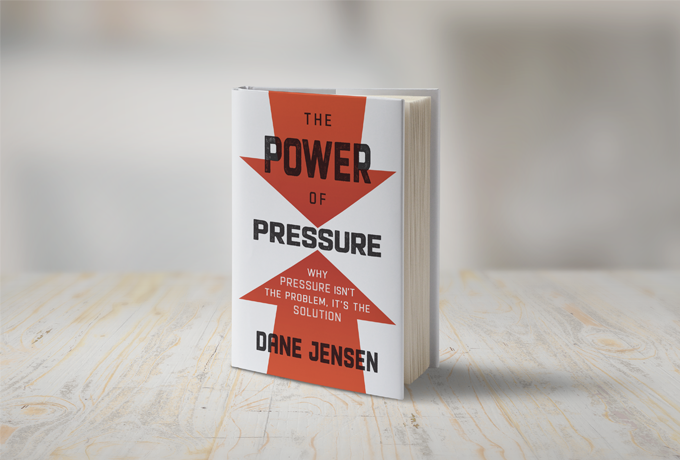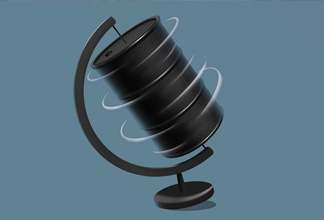Power Play: How to Harness Pressure to Thrive
Written by Lisa Rostoks
Published on August 31, 2021
minute read
Share:
If you feel uncomfortable in pressure-filled situations – or try to avoid them altogether – you're not alone. Pressure can cause us to doubt ourselves or react irrationally when we need to perform our best. But it can also fuel the fire within us.
Take elite athletes, who have an incredible ability to focus and deliver world-class wins while facing intense pressure. How do they do it? One key, according to author and CEO Dane Jensen, is leveraging the right formula for the type of pressure you're facing – whether it's on the Olympic stage, in the boardroom or navigating markets.
Jensen has spent years asking individuals about their experience with pressure, and specifically about the most pressure they've ever been under. His soon-to-be-released book, The Power of Pressure, is a culmination of what he learned from questioning elite athletes, U.S. Navy SEALs, emergency doctors and everyday people. Spoiler alert: Jensen makes the case for embracing pressure and using its power to drive us to new levels of growth and performance.
“When we observe individuals who have been able to accomplish great things in the face of sustained pressure, nearly all are driven by a strong sense of purpose," Jensen wrote in his book. Former Paralympic athlete Rick Hansen is one such example. Hansen told Jensen that the most pressure he ever felt came as he prepared to circumnavigate the world by wheelchair in his Man in Motion tour – which happened 35 years prior to their conversation.
“I wasn't sleeping well. I also knew that I was getting crankier and crankier. I was scared. I really felt that the pressure I was under was so immense that I was going to crumble before I even started," Hansen told Jensen. But Hansen, as the author points out, was able to endure 26 months of anguish through more than 24,000 miles and 34 countries because he had a clear purpose – contributing to a world without barriers.
While you may not face enemy fire like a US Navy SEAL, or be trying to self-propel yourself around the globe, there are ways to embrace pressure to help us thrive.

Jensen focuses on two main categories of pressure: long-haul pressure and peak pressure moments. In a recent interview, he broke down what those mean, particularly for investors, and explained how we can capitalize on each.
Long-Haul vs Peak Pressure
As investors, at various times we can fall within both of the pressure categories Jensen describes – long-haul and peak. For example, those of us investing for the long term, with lengthy time horizons, are likely to experience “long-haul" or enduring pressure to make smart investment decisions that will pay off over time. When we're facing significant market shifts or time-sensitive financial opportunities, it's more about peak pressure moments, which are characterized by more intense situations. Jensen says it's possible to capitalize on both by pulling on the right levers of what he refers to as the “pressure equation."
Pressure = Importance X Uncertainty X Volume
Jensen's pressure equation is essentially a formula that takes into account three factors – importance, uncertainty and volume – that are present in some variation when we feel pressure. The combination of the three affects the intensity of pressure we feel. If the outcome of a situation is very important to us, such as the health of a loved one, the stakes are higher. A lot of uncertainty raises the pressure. And when managing a high volume, we feel the heat more.
To manage the long-haul, Jensen says the “importance" part of the equation is the key to connecting what we're doing with achieving what we want in life. However, “tension exists in investing because of the importance of what it represents (a certain lifestyle or family security), and it can lead to a disproportionate amount of pressure if we give it too much importance." Just as we might diversify our investments, balancing our perspective so that we don't view our investment returns as the sole marker for a satisfying life can help prevent elevated stress.
When it comes to the “uncertainty" part of the equation, which most investors know well, Jensen offers some tips.
“Those who manage pressure best don't get spooked by the peak pressure associated with short-term market fluctuations and can embrace uncertainty over the long haul," he said. This often means fighting the impulse to react with every bump and turn and acting rationally when assessing market shifts.
As for the volume of pressure we experience, an effective way to manage it is to simplify. Jensen recommends questioning whether there are tasks you can delegate or eliminate to free your focus for the most pressing items.
“There's always one thing you can control," said Jensen, referring to managing uncertainty. “If you can look ahead and say, well, I have insurance, a will…these are things you can control which reduce the stakes during a peak pressure moment." Likewise, for investors, preparing in advance by knowing what you're comfortable with, having a plan and setting goals can provide a roadmap for decision-making in high-pressure situations.
Underpinning all the considerations for tapping into the power of pressure is the ability to control your attention.
“So much competes for our attention," Jensen says. If we're continually checking our portfolios, for example, “we're giving our attention completely to this and therefore elevating the importance and the pressure," he said. “We can manage ourselves through information hygiene. Be deliberate about what helps and what doesn't so that you're keyed in on the long term rather than moment-to-moment." For example, asking “what's not at stake?" can help shift our focus to areas of our lives that will remain stable regardless of the outcome of the situation we're facing.
Asking great questions may be the pressure superpower. In his book, Jensen says nothing has the power to focus our attention like a question. Jensen writes about a sports psychologist working with tennis coaches to reframe a demand such as “watch the ball!" to a question like “what brand of ball are you hitting?" He says, “the player has no choice but to watch the ball at a totally different level of intensity than they were previously. It's the question, not the command, which allows us to redirect our attention under pressure."
Overall, Jensen believes pressure doesn't get as much credit as it should. “Pressure can give us superpowers if we know how use it. Pressure sets world records. Pressure fuels bravery. Pressure breeds persistence. Pressure is power," he concludes in his book.
|
Pressure Points In The Power of Pressure, author Dane Jensen offers a few questions that can be used as tools to help us focus our attention when we're under pressure. Here's a selection of questions he suggests asking yourself:
|
RBC Direct Investing Inc. and Royal Bank of Canada are separate corporate entities which are affiliated. RBC Direct Investing Inc. is a wholly owned subsidiary of Royal Bank of Canada and is a Member of the Canadian Investment Regulatory Organization and the Canadian Investor Protection Fund. Royal Bank of Canada and certain of its issuers are related to RBC Direct Investing Inc. RBC Direct Investing Inc. does not provide investment advice or recommendations regarding the purchase or sale of any securities. Investors are responsible for their own investment decisions. RBC Direct Investing is a business name used by RBC Direct Investing Inc. ® / ™ Trademark(s) of Royal Bank of Canada. RBC and Royal Bank are registered trademarks of Royal Bank of Canada. Used under licence.
© Royal Bank of Canada 2025.
Any information, opinions or views provided in this document, including hyperlinks to the RBC Direct Investing Inc. website or the websites of its affiliates or third parties, are for your general information only, and are not intended to provide legal, investment, financial, accounting, tax or other professional advice. While information presented is believed to be factual and current, its accuracy is not guaranteed and it should not be regarded as a complete analysis of the subjects discussed. All expressions of opinion reflect the judgment of the author(s) as of the date of publication and are subject to change. No endorsement of any third parties or their advice, opinions, information, products or services is expressly given or implied by RBC Direct Investing Inc. or its affiliates. You should consult with your advisor before taking any action based upon the information contained in this document.
Furthermore, the products, services and securities referred to in this publication are only available in Canada and other jurisdictions where they may be legally offered for sale. Information available on the RBC Direct Investing website is intended for access by residents of Canada only, and should not be accessed from any jurisdiction outside Canada.
Explore More

What Investors Can Learn from Hockey Star and RBC Olympian Sarah Nurse
Nurse's path to the podium reveals how preparation, planning and practice can turn potential into a golden opportunity
minute read

Crude Questions? A Look at Canada’s Oil Economy
What you need to know about Canada’s oil industry
minute read

How Inflation-Proof Are Your Investments?
Why inflation still matters – and how to stay ahead of it
minute read
Inspired Investor brings you personal stories, timely information and expert insights to empower your investment decisions. Visit About Us to find out more.







